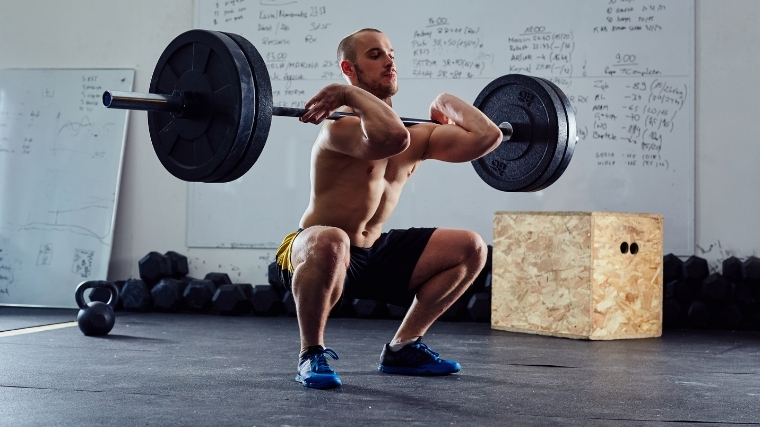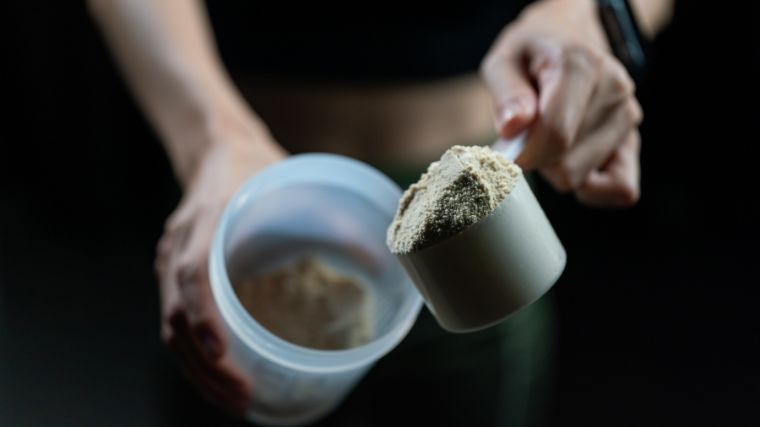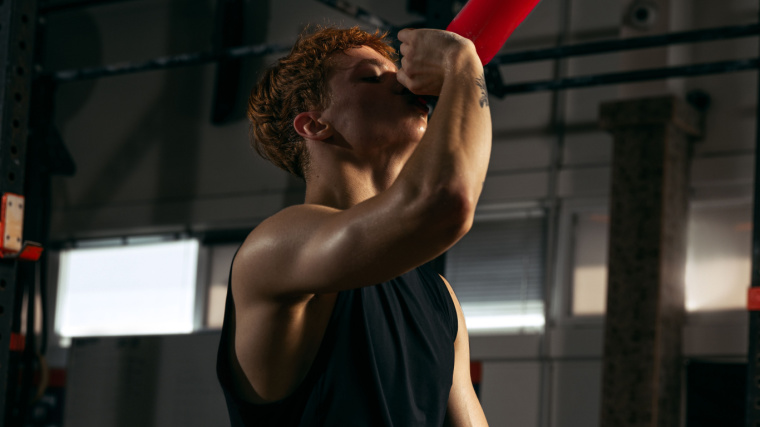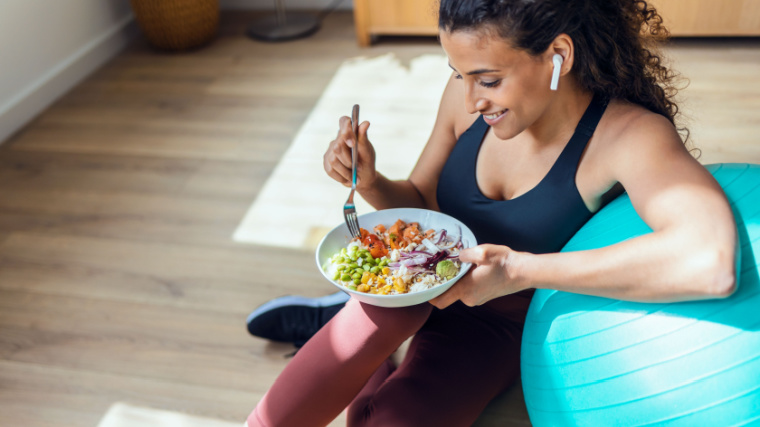You know what to do during your workout. You know your reps, sets, and the percentage of your one-rep max that you’re trying to crush. But lingering questions of what to eat after a workout may well linger in your mind (especially as hunger approaches).
Here, you’ll get the skinny — and the bulked — on what to eat, how to figure out your macros, and overall the best post-workout food habits for your goals and preferences.

Editor’s Note: The content on BarBend is meant to be informative in nature, but it should not be taken as medical advice. When starting a new training regimen and/or diet, it is always a good idea to consult with a trusted medical professional. We are not a medical resource. The opinions and articles on this site are not intended for use as diagnosis, prevention, and/or treatment of health problems. They are not substitutes for consulting a qualified medical professional.
Why You Should Eat After a Workout
When you go all out in a training session, your body burns through glycogen stores, loses fluids, and tears up your muscle tissue. Don’t worry — that’s a good thing. Eating the right foods after training helps repair this (good) damage.
And to stop the panic before it starts — no, you don’t have to scarf down a set amount of protein immediately after your workout or all your sweat was for naught. Yes, there are still persist claims that you need to eat within 30 minutes before your “anabolic window” closes.
Nowadays, science shows the window may last up to 24 hours, though the benefits can decrease as you get further away. (1)(2) Sure enough, one review suggests shifting the language from “post-workout anabolic window” to a “garage door of opportunity.” (3)
What you eat throughout the day may be more important than what you eat immediately after training. Still, eating within a few hours after your workout is important — let’s break down the reasons why.
Refills Glycogen Stores
One of the top reasons you need to eat after a workout is to refill your glycogen stores. Your body uses glycogen as a big energy source during high-intensity exercise. While it’s often associated with endurance training, you also use glycogen during resistance training. (1)
You’ll need to keep up your supply of glycogen to help sustain levels of ATP (adenosine triphosphate), which your body uses as energy for short-duration, high-intensity exercises like a set of heavy front squats or sprinting. (1)

[Read More: The Best Foods for Energy Before, During, and After Your Workouts]
Bodybuilders who do high-volume training — multiple exercises, reps, and sets for the same muscle groups — use a ton of muscle glycogen and will need some refueling. Consuming carbohydrates within two hours of endurance or resistance training is thought to help refill your glycogen stores, assuring you’ll have energy for your next workout. (1)(3)
According to the International Society of Sports Nutrition (ISSN), including carbs in your post-workout nutrition on their own or with protein helps replenish muscle glycogen stores and heals muscle damage. (4)
Helps Repair Muscle
Post-workout muscle recovery starts with what you eat after training. During an intense workout, you break down your muscle fibers. Post-workout nutrition helps repair damaged muscle tissue and start muscle recovery.
After endurance and strength training, protein repairs muscle tissue and damaged cells while initiating hormonal and metabolic activity. (5)
The ISSN notes that carbs and protein together (but protein a bit more) contribute to repairing muscle tissue, decreasing muscle damage, improving post-workout recovery, and rebalancing hormones. (4)

[Read More: The Best Supplement Stacks For Bodybuilders, Vegans, and More]
Some types of protein, like whey, can also help reduce inflammation, potentially decreasing muscle soreness. Whey protein is rich in all essential amino acids and is high in cysteine. Cysteine stimulates glutathione production. Glutathione is an antioxidant that can help fight inflammation and temporary oxidative stress caused by exercise, boosting immune function during recovery. (2)(6)
Helps Build Muscle
When you’re looking to build muscle, hitting your overall caloric and protein intake matters more than timing, but post-workout nutrition is a great spot to make gains. (4)
When paired with resistance training, protein is well-known to help build muscle by regenerating muscle fibers and stimulating muscle protein synthesis (MPS). For muscle growth, your body needs all 20 amino acids (11 non-essential and nine non-essential) present in high-quality, complete protein sources. (7)
[Read More: The Best Supplements for Muscle Growth]
The ISSN states that getting your essential amino acids in with 20 to 40 grams of high-quality protein helps stimulate MPS. Consuming it within two hours of training may stimulate higher rates of MPS, but it doesn’t make the biggest difference in the world. (4)
Outside the post-workout window, consuming 20 to 40 grams of protein every three to four hours throughout the day also helps MPS and leads to hypertrophy (muscle growth) when you’re following a resistance training program. (4)
Replenishes Your Fluids
Refueling with food is part of post-workout nutrition, but you also need to rehydrate. When you exercise, you lose water, salt, and electrolytes. It’s essential to keep your hydration levels high before, during, and after an intense workout.
According to the American College of Sports Medicine (ACSM), giving a one-size-fits-all recommendation for fluid intake is difficult. It depends on the climate, how much the person sweats, the level of intensity, and the duration of the workout. But, they note the importance of rehydrating with electrolytes, not just water. (8)
What to Eat After a Workout
Now that you know why to eat after a workout, let’s get into the what. You want to aim for a balance of macronutrients — protein, carbs, and fat. Depending on your goal and type of training, you may want to play with your macros, but we’ll get into that next.
Here are a few ideas for building the perfect post-workout shake, snack, or meal.
Plenty of Fluids
First, don’t forget your fluids.
For intense workouts lasting over 70 minutes, the ISSN suggests rehydrating with water mixed with carbohydrates and electrolytes. You can get a pre-made sports drink, coconut water, or make your own by mixing water with salt. (4)(9)
[Read More: Best Greens Powders]
If you’re having a post-workout snack or meal with fruits and veggies, you can choose options with a high water content, like cucumbers and watermelon, to get extra hydration.
Post-Workout Protein Shake Ideas
Protein shakes are a quick way to refuel after a workout. You can use a few ingredients for a post-workout snack or add more if you want a meal-replacement shake.
If you’re using supplements, opt for a high-quality, complete protein, like whey protein powder. High-quality, complete protein sources contain all the essential amino acids your body needs to build muscle and recover. For vegan athletes, soy protein powder has comparable benefits to whey.

[Read More: Protein Vs. BCAA Supplements — Which to Take and When?]
Here are some protein shake recipes that give you protein, carbs, and fat:
- Protein powder, frozen fruit, peanut butter or nut butter, chocolate milk or non-dairy milk
- Protein powder, frozen fruit, oats, chia seeds, chocolate milk or non-dairy milk
- Protein powder, frozen veggies, avocado, non-dairy milk
- Protein powder, frozen veggies, hemp seeds, ginger, turmeric, non-dairy milk
If you want to skip the supplements, use a whole-food protein source like cottage cheese or Greek yogurt instead of protein powder in the above recipes.
Post-Workout Snack Ideas
Depending on what time of day you train, you may want to have more of a post-workout snack than a full meal. For building muscle, aim to get 20 to 40 grams of protein in your snack, so you may need to play around with these.
- Cottage cheese or Greek yogurt, fruit, peanut butter or nut butter, granola
- Hard-boiled eggs, deli meats, veggies, and hummus
- Quinoa or oats with edamame
- Whole grain toast with nut butter, cottage cheese, or low-fat cheese
Post-Workout Meal Ideas
Whether it’s breakfast, lunch, or dinner, you can build a balanced meal packed with protein, carbs, and fats to help you refuel after your workout.
Here are some high-protein foods to choose from when building your post-workout meal:
- Chicken or turkey breast
- Ground beef or turkey
- Salmon
- Eggs
- Plant-based: tofu or tempeh
Choose your favorites and plug them into the following ideas:
- Post-Workout Bowl: Protein source + brown rice, quinoa, or sweet potatoes + veggies + hummus
- Post-Workout Plant-Based Bowl: Tofu or tempeh + edamame + quinoa + sweet potatoes + veggies + hummus
- Post-Workout Breakfast: Eggs + turkey bacon + low-fat cheese or avocado + whole grain toast or sweet potatoes
- Post-Workout Plant-Based Breakfast: Tofu or tempeh scramble + avocado + whole grain toast or sweet potatoes
Macros Explained
You hear a lot about macronutrients — or macros — in the gym, but what are they? Protein, carbohydrates, and fats are the three sources of energy — or calories — in your food. Other vitamins and minerals in your food are micronutrients. (10)
Research generally focuses on protein and carbs for post-workout nutrition.
Protein
Protein is made up of amino acids, known as building blocks. Protein is the most important macronutrient for building muscle and losing body fat since it helps increase satiety and retain muscle mass. (11)
[Read More: The Best Healthy Fast Food Options at the Most Popular U.S. Chains]
If you mainly do endurance exercise, you may need less protein than someone who does more strength training. The ISSN suggests aiming for a range of 1.4 to 2.0 grams of protein per kilogram of body weight per day. Endurance athletes can aim for the lower end, while strength athletes should go higher. (2)
As mentioned, the ISSN suggests getting 20 to 40 grams of a high-quality protein source within two hours of training for muscle recovery and growth. (2)
Carbohydrates
Carbohydrates are a major source of energy for exercise. Carbs get converted to glycogen, which is why you need them post-exercise to refill your glycogen stores. Endurance athletes tend to need an even higher carbohydrate intake than strength athletes.
When it comes to timing for refueling with carbohydrates, it’s more important for athletes who need a quick recovery if they are training again later that day. The ISSN defines a high-carb diet for endurance athletes as eight to 12 grams of carbohydrates per kilogram of body weight per day. (4)
If you need to recover within four hours for another session, they recommend 1.2 grams of carbs per kilogram of body weight per hour until your next workout. (4)

The ISSN states that when you’re doing moderate to high-intensity endurance training for more than 60 to 90 minutes, you burn through more stored glycogen, and rapid refueling can help with recovery. (4)
According to a 2022 systematic review, strength athletes may want to consume 15 grams of carbohydrates and 0.3 grams of protein per kilogram of body weight within three hours of training to refill their glycogen stores. The review notes that if you’re doing more than 11 sets per muscle group or are planning to train again later that day, you can aim for 1.2 grams of carbs per kilogram of body weight per hour. (12)
Fats
While fats are important to your overall diet, the ISSN states there isn’t much research on how they affect post-workout nutrition. There doesn’t seem to be a window of time that you need to consume them. (4)
Still, having fat as part of your post-workout snack, meal, or shake can help you feel satisfied and contribute to your overall daily macro intake.
How to Calculate Your Macros
People prefer different macro percentages based on their training style and fitness goals. Figuring this out first can help you when you plan your post-workout nutrition.
To take some of the guesswork out of it, you can use some of BarBend’s calculators.
If you have a specific body composition goal, BarBend’s calorie calculator may be helpful. If you have a history of disordered eating or just want to avoid counting calories, check out how to use portion control instead.
Calorie Calculator
Next, you’ll want a personalized protein intake goal.
Protein Intake Calculator
Finally, it’s time to calculate your macros. Put your stats and goals into our calculator to get a customized percentage.
Macronutrient Calculator
Your Takeaways
- Your overall intake of calories and macronutrients matters more than adhering to a specific window around your exercise sessions.
- Still, research shows that getting good quality protein, carbs, and fat within two to three hours of your training session can refill your glycogen stores, rehydrate your fluids, help repair muscle tissue, and help build muscle.
- After a session, you can do a protein shake, snack, or meal. Aiming for 20 to 40 grams of protein is helpful.
- You can go with higher or lower carbs, depending on if your workout was more focused on endurance or strength training.
FAQs
Got some more questions on what to eat?
What is the best thing to eat after a workout?
Eating a balanced meal (or snack or shake) that contains 20 to 40 grams of protein with some carbs and fats is best. You can have anything you like that fits the criteria.
Should I eat immediately after a workout?
Sure, you can eat immediately after if you want to. Try to eat within at least two hours, but the gains window may go on all day — so there’s no need to rush to grab a meal.
What is a good post-workout snack?
A protein shake is a good and quick snack. Greek yogurt or cottage cheese with fruit and nut butter is also good. You can have leftovers or a smaller amount of a meal you like as a snack. Just keep the protein high.
References
- Aragon AA, Schoenfeld BJ. Nutrient timing revisited: is there a post-exercise anabolic window? J Int Soc Sports Nutr. 2013 Jan 29;10(1):5.
- Jäger, R., Kerksick, C.M., Campbell, B.I. et al. International Society of Sports Nutrition Position Stand: protein and exercise. J Int Soc Sports Nutr 14, 20 (2017).
- Arent SM, Cintineo HP, McFadden BA, Chandler AJ, Arent MA. Nutrient Timing: A Garage Door of Opportunity? Nutrients. 2020 Jun 30;12(7):1948.
- Kerksick CM, Arent S, Schoenfeld BJ, Stout JR, Campbell B, Wilborn CD, Taylor L, Kalman D, Smith-Ryan AE, Kreider RB, Willoughby D, Arciero PJ, VanDusseldorp TA, Ormsbee MJ, Wildman R, Greenwood M, Ziegenfuss TN, Aragon AA, Antonio J. International society of sports nutrition position stand: nutrient timing. J Int Soc Sports Nutr. 2017 Aug 29;14:33.
- Kreider RB, Campbell B. Protein for exercise and recovery. Phys Sportsmed. 2009 Jun;37(2):13-21.
- Marshall K. Therapeutic applications of whey protein. Altern Med Rev. 2004 Jun;9(2):136-56.
- Camera DM. Evaluating the Effects of Increased Protein Intake on Muscle Strength, Hypertrophy and Power Adaptations with Concurrent Training: A Narrative Review. Sports Med. 2022 Mar;52(3):441-461.
- American College of Sports Medicine; Sawka MN, Burke LM, Eichner ER, Maughan RJ, Montain SJ, Stachenfeld NS. American College of Sports Medicine position stand. Exercise and fluid replacement. Med Sci Sports Exerc. 2007 Feb;39(2):377-90.
- Douglas S Kalman, Samantha Feldman, Diane R Krieger & Richard J Bloomer (2012) Comparison of coconut water and a carbohydrate-electrolyte sport drink on measures of hydration and physical performance in exercise-trained men, Journal of the International Society of Sports Nutrition, 9:1.
- Carreiro AL, Dhillon J, Gordon S, Higgins KA, Jacobs AG, McArthur BM, Redan BW, Rivera RL, Schmidt LR, Mattes RD. The Macronutrients, Appetite, and Energy Intake. Annu Rev Nutr. 2016 Jul 17;36:73-103.
- Paddon-Jones D, Westman E, Mattes RD, Wolfe RR, Astrup A, Westerterp-Plantenga M. Protein, weight management, and satiety. Am J Clin Nutr. 2008 May;87(5):1558S-1561S.
- Henselmans M, Bjørnsen T, Hedderman R, Vårvik FT. The Effect of Carbohydrate Intake on Strength and Resistance Training Performance: A Systematic Review. Nutrients. 2022 Feb 18;14(4):856.
Featured Image: ME Image / Shutterstock